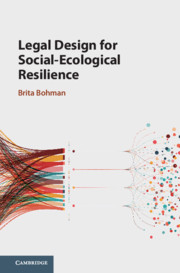Book contents
- Legal Design for Social-Ecological Resilience
- Legal Design for Social-Ecological Resilience
- Copyright page
- Contents
- Preface and Acknowledgments
- Table of Treaties and International Instruments
- Table of EU Law
- Table of Cases
- Abbreviations
- 1 Introduction
- 2 Environmental Law
- 3 Law and Governance
- 4 Defining Features for Resilience Governance
- 5 Adaptivity, Flexibility and Transformability
- 6 Multidimensional and Polycentric Structures
- 7 Stakeholders and Structures for Participation
- 8 Operationalization, Monitoring, Compliance and Trust Building
- 9 Conclusions – Effective Legal Design for Resilience Governance
- References
- Index
1 - Introduction
Published online by Cambridge University Press: 10 March 2021
- Legal Design for Social-Ecological Resilience
- Legal Design for Social-Ecological Resilience
- Copyright page
- Contents
- Preface and Acknowledgments
- Table of Treaties and International Instruments
- Table of EU Law
- Table of Cases
- Abbreviations
- 1 Introduction
- 2 Environmental Law
- 3 Law and Governance
- 4 Defining Features for Resilience Governance
- 5 Adaptivity, Flexibility and Transformability
- 6 Multidimensional and Polycentric Structures
- 7 Stakeholders and Structures for Participation
- 8 Operationalization, Monitoring, Compliance and Trust Building
- 9 Conclusions – Effective Legal Design for Resilience Governance
- References
- Index
Summary
Despite the fast development of environmental governance and environmental law over the past decades, the world is facing fundamental threats to the environment and the earth system. Many scholars argue that the world is entering the Anthropocene, a new geological epoch represented by the fact that the earth is now in an unprecedented way shaped by human activities. In addition to reflecting the global scale of the environmental problems, this perspective also emphasizes the complex and intertwined relationship between the human and the natural systems (i.e., the social and the ecological). Research on social-ecological resilience provides a theoretical framework for the governance of such complexity. This governance calls also for new legal approaches and pose significant challenges for legal design. The purpose of this book is to explore the resilience theories and concepts, focusing on their compatibility with international and EU environmental law.
- Type
- Chapter
- Information
- Legal Design for Social-Ecological Resilience , pp. 1 - 15Publisher: Cambridge University PressPrint publication year: 2021

